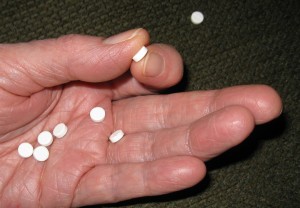
Text and photo by Sally Kneidel, PhD, at sallykneidel.com
According to the CDC, about one in five Americans are affected by depression and/or anxiety. That seems about right to me, or maybe even a low estimate. Perhaps women talk about it more, but it seems to me at least half my close friends struggle with anxiety or depression at some point. Could be because it’s February right now. You know, seasonal affective disorder (SAD). SAD is depression brought on by the diminished daylight hours of winter. Check out the symptoms and solutions for season affective disorder on WebMD. It’s more common than I used to think.
But anyway, I didn’t start this post to discuss depression.
What caught my attention, and what I want to tell you about, is a recent report about antidepressants. This report was published in the Journal of the American Medical Association.. The authors of the study concluded that antidepressants don’t seem to work well for people with mild or moderate symptoms of depression.
A depression-rating questionnaire
To back up for a moment, it turns out that pharmaceutical companies test their new medications only on subjects who are severely or very severely depressed, because the tests are then more likely to show that the medicines are effective. In order to qualify for a clinical trial of a new antidepressant, a subject must score over 19 on a standardized test (the Hamilton Depression Rating Scale ) that rates the degree of depression. A score of 20 or more qualifies you as severely or very severely depressed. I understand the pharmaceutical companies’ perspective – they want their drugs to be approved by the FDA, so they pick the subjects most likely to improve on the med being tested.
But is it ethical, to then claim that the medicine is effective for people with any degree of depression?
Perhaps not. Says Gregory Simon, a mental health researcher in Seattle, “About half the people treated by doctors fall into the moderate or even mild range.”
Do antidepressants work better than placebos?
In the JAMA study referenced below, Fournier and DeRubeis and their colleagues compared depressed people taking an antidepressant with depressed people taking a placebo. They grouped their subjects according to their score on the Hamilton Depression Rating Scale. For subjects who scored less than 25 on the test, the antidepressants had so significant effect or only “a small effect” over the placebo. For subjects scoring higher than 25 on the test, the antidepressants did have “a clearly significant effect.”
The authors of the JAMA article concluded that “the magnitude of benefit of antidepressant medication may be minimal or nonexistent, on average, in patients with mild or moderate symptoms.”
So what does it mean? Should mildly or moderately depressed people be prescribed antidepressants? Is there any chance of their being significantly helped by the medications?
Dr. Philip Wang, deputy director of the National Institute of Mental Health, says that consumers with mild symptoms shouldn’t necessarily be scared off drugs.
“They don’t not work for everyone, and they don’t work for everyone,” Wang says. “I think buried within the group are people who do respond if they have mild or moderate depression.” He recommends that doctors monitor patients who don’t respond to meds, and offer then alternative treatments instead.
Wang sounds a bit evasive.
$9.5 billion in 2008 sales of antidepressants
One option for doubtful patients is to take the test (link below), print this post, and show it to your doctor. Why take meds if they’re not helping? Most antidepressants have side effects that can be unpleasant…including sexual dysfunction, headaches, constipation, and stomach upset. Are we being bilked by the pharmaceutical companies? Antidepressants were the third most popular type of drug dispensed in 2008, with $9.5 billion in sales! The strategies of the huge pharmaceutical companies are working, that much is clear. But then again…..when meds do help with depression, they can help a lot.
It’s hard to know for sure. I do know that we need more studies to tell us definitively if antidepressants can help mildly or moderately depressed people, who comprise a huge segment of our population.
Sources:
“Treatment works: get help for depression and anxiety”. Centers for Disease Control and Prevention.
www.cdc.gov
“What is seasonal affective disorder (SAD)?” www.WebMD.com
Jay C. Fournier, Robert J. DeRubeis et al. “Antidepressant drug effects and depression severity.” Journal of the American Medical Association 303:47-53. January 6, 2010.
Alix Spiegel. “Meds may only help those with severe depression.” All Things Considered, NPR. January 6, 2010.
Hamilton Depression Rating Scale
Rebecca Ruiz. “America’s most medicated states.” www.forbes.com 8/17/09
Keywords:: depression, health, medication, antidepressants, antidepressants work only for severe depression, depression questionnaire, depression rating scale





